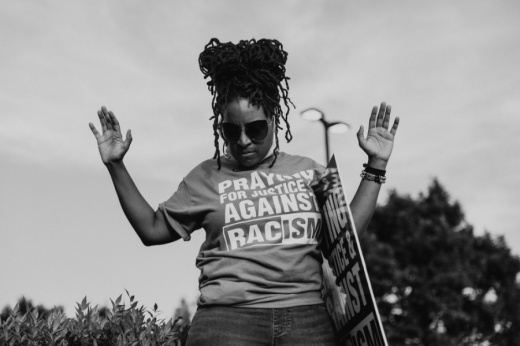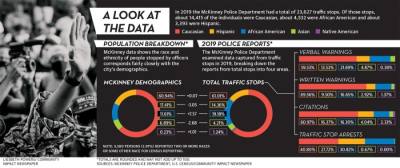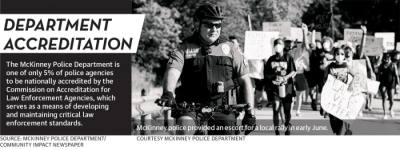The incident provided Chief Greg Conley with what he called a “springboard” to implement training and procedures for an issue he was already wanting to address, he said.
Over the past five years, the police department has implemented de-escalation trainings and formed a Chief’s Advisory Council. But McKinney City Council Member La’Shadion Shemwell and others say these changes are not enough.
Shemwell, who is Black, was unable to garner support from fellow council members several months ago when he asked the city to proclaim a “Black State of Emergency” during a council meeting.
Shemwell’s request followed comments at an October City Council meeting from several residents who voiced their concerns on the treatment of Black people in the North Texas area. Their comments specifically mentioned the deaths of Botham Jean and Atatiana Jefferson, who were both shot inside of their homes by police officers in unrelated incidents in the Dallas-Fort Worth area.
A recall election for Shemwell was triggered by a citizen-initiated petition that received more than 3,100 signatures from registered McKinney voters. The petition began circulating last year shortly after a series of contentious McKinney City Council meetings were dominated by racially heated conversations that led to the request for the Black State of Emergency proclamation. The recall election was supposed to take place in May but has been postponed to November due to the coronavirus pandemic.
McKinney Mayor George Fuller said he agreed with most of what Shemwell said in his proclamation, but that he did not agree with a declaration that “the state of Texas and its local governments have declared war on its Black and brown citizens,” he said.
“I happen to be part of a local government, and for me to agree to this proclamation would state that I think this local government had declared war on its Black and brown citizens,” Fuller said in an October interview. “It’s appalling to me to have those statements made and have those indictments of us as an elected body.”
In a virtual town hall with the Collin County chapter of the National Association for the Advancement of Colored People, Chief Conley said he has worked to build a culture in the police department “surrounded by basic fundamental human values.”
Now, with the police killing of George Floyd in late May fresh on everyone’s minds, community leaders, parents and youths are calling for continued conversations about race in McKinney following several protests.
‘Frustration and disenchantment’
On June 16, President Donald Trump issued an executive order that incentivizes law enforcement agencies to meet certain standards involving use-of-force and de-escalation and to provide accountability for doing so. The order was signed in light of the nationwide protests sparked by Floyd’s death.
For some, the protests are an expression of frustration and anger with the current justice system, said Leroy Armstrong, a pastor at First McKinney Baptist Church, and Floyd’s death in Minneapolis is the latest example.
“When it happens over and over and over and over again, it leads to a group of people having a sense of frustration and disenchantment with the system,” Armstrong said, “because the system is not working for them.”
McKinney does have a problem with racism, said attorney Kim T. Cole, who represented Dajerria Becton—from the pool party—and her family in a civil suit against the city that was later settled out of court. Police had been called out to the neighborhood pool about a fight between a white woman and a Black teen girl at the party.
Police Cpl. Eric Casebolt resigned after a video was posted showing him pinning 15-year-old Becton to the ground. He also pulled his gun and pointed it at nearby teens who appeared to be trying to help Becton, according to the video.
“If you look at that tape from the pool party, there is an image of the officer sitting on a 15-year-old, 100-pound girl with his knee on her neck,” Cole said, drawing comparisons to the video of Floyd being detained by a police officer kneeling on his neck for 8 minutes and 46 seconds.
Systematic racism is something Black people have to deal with constantly, Shemwell said, especially “east of Highway 5” in McKinney.
“I’ve had numerous experiences with police targeting and pulling me over and harassing me, and not just me,” he said. “I get calls and emails and texts all the time about my community being harassed. And that’s why I issued the Black State of Emergency. It’s not about me. It’s about me representing the needs and the concerns of my community.”
A June 4 gathering of churches in Collin County sought to increase dialogue around those concerns. Roughly 150 churches were represented at the gathering as people prayed and spoke about racism and justice from the steps of the Collin County Courthouse in McKinney.
“I decided to come out here to ... bring justice to a system that is not for us,” attendee Chiamaka Duru said. “I think prayer brings people together, and I’m glad that people were able to join in on a conversation about racism, about the injustices, and then be able to pray our way out of all the things we’ve experienced and gone through in history.”
Changes in the police department
The Police Chief’s Advisory Council was created five years ago in the aftermath of the pool party. Conley said his goal was to pick people “representative of the community.” The council has 13 members, most of them minorities, Conley said.
“They are very, very good advisers to me, and they challenge me,” Conley said during the NAACP virtual town hall. “They’ve been invaluable in helping me and helping move the department forward.”
Conley first had the council overhaul the department’s use-of-force policy. This has been one of the most significant changes to the department, Conley said.
The police department has also increased its minority hiring, moving from 22% minority officers in 2016 to 42% at present, he said.
Armstrong was among the first to serve on the Advisory Council. He said there have been positive policing changes made in the city and that the momentum and the efforts of the advisory council partnering with the chief need to continue.
“Chief Conley is doing an excellent job setting the culture,” Armstrong said. “And the culture that exists in McKinney is, ‘It is not OK for you to use excessive force.’ We couldn’t say that five years ago. So we just need to keep doing that.”
Floyd’s death has spurred more conversations between the McKinney Police Department and the city’s minority communities; MPD is working to assure people that they are committed to “fair, compassionate and impartial policing,” Conley said.
“McKinney has done a good job of building community relations, though we realize we have a ways to go,” Conley said in an email.
The city’s police department is something to be proud of, Mayor Fuller said. City Council Member Frederick Frazier pointed out that McKinney was named the safest Texas city of its size.
But some people, such as Cole and Sean Howe, the executive director of the McKinney nonprofit Flourish Community Based Initiatives, said what has been done so far is not enough. Cole pointed to Shemwell’s Black State of Emergency, which she said she helped draft. She said proclamations such as this need to be taken more seriously. Further, Howe stated his belief that the chief’s advisory council provides “no real oversight.”
“It’s whoever he deems fit to bring on there,” he said. “What we’re looking for is more accountability, not an advisory capacity. Yes, we want to advise, but we also want accountability.”
Moving forward
Howe said he is working with the mayor to help put together a community task force and that the mayor will evaluate what that might look like before it is brought to City Council.
In addition, Fuller is looking into assembling a mayor’s advisory council. He said his goal is to adopt a similar structure as the police chief’s advisory council.
“My criteria will be, ‘Who’s engaged in the community, and who do I feel has got the community as their No. 1 priority?’” Fuller said.
The community diversity task force is an initiative that will have to be council-driven, Fuller said. City Council should be engaged in the process of selecting members of the task force, as they can represent the community that elected them, he said.
The McKinney Chamber of Commerce is also taking steps to embrace inclusion and diversity. It announced in mid-June a plan to partner with other McKinney-based groups to support a diverse and inclusive workforce as well as to examine whether its membership accurately reflects the diversity of McKinney.
The police department also recently began implicit bias training to help officers identify any biases of which they might not be consciously aware, Conley said.
Change and progress in regards to racism and social justice are ultimately going to look different for every city, Fuller said.
“Every community needs to look at their situation, their police department, their practices, what are they doing and what training are they doing,” Fuller said. “I think the answer for every community is going to be slightly different than their next-door community.”
Additional reporting by Liesbeth Powers








